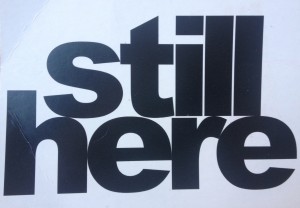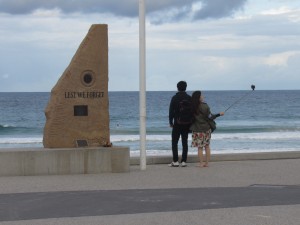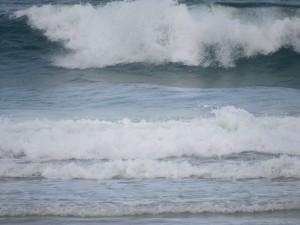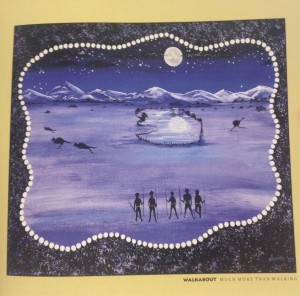My cousin John Power introduced me to (seemingly!) intractable questions about time.
Does the past, present and future exist outside our minds and filing/classification processes? Some cultures/languages do not have a future tense. In Irish, we overuse the special verb “bí”, to be, when translating into English. “I do be” can be (!) heard, or “he is dead”, relegating events into the present tense, rather than the past (“he died”). If different time periods do exist, how do we define or measure them? In the nano seconds that it takes to process the stimuli around us through our senses, the moment has passed and we are not in the present anymore.

In the past two years in Auckland, I was introduced to the concept of “infinite games” by a cool psychology lecturer (Niki Harre of Auckland Uni) I worked with, based on James Carse’s work from the 1980s. Infinite games are those we play for the sake of continuity alone – such as love/meaningful relationships; but also of interest to my work for preserving/caring for our environment for future generations, and how we can govern to ensure such infinite games can take place.
With these ideas as a backdrop, I have just read Milan Kundera’s “Ignorance” and am in the process of reading Witi Ihimaera’s “Maori Boy”…..and some of these concepts are re-emerging and grabbing my attention!
Witi Ihimaera (in Maori Boy), describes Maori as walking backwards into the future.
Maori have a time called ‘i ngā wā o mua’ – the days that have gone before us. It alludes to a way of looking at the past as something that doesn’t lie behind us but is in front of us. People and events are not to be consigned to the past tense but are watching over us and still waiting to be accounted to. Maori see time as a spiral, turning in on itself, crossing over itself (and they travel through life with their whakapapa ever with them).
Kundera talks about the creative revival that occurred in Prague prior to the Russian/Communist overtaking in the 1960s. He describes all predictions of the future being wrong. The Czechs (post war to late 1960s) believed that they had an infinity ahead. They had it wrong, but they lived in a state of joy that led to their creativity to flourish. After the Russian invasion, with no inkling of oppression and Communism’s end, the infinity they inhabited was very different. It was not the pain of their current life but the vacuity of the future that sucked their energies dry.
Kundera also argues that memory cannot be understood without a mathematical approach. However no one has calculated the ratio between the amount of time in the lived life and the amount of time from that life that is stored in memory. Does memory retain one millionth, a hundred millionth, an infinitesimal bit of the lived life?
If someone could retain their memory of everything they had experienced, they would not be human!
So what fragments of the past do we remember? Things with words attached to them? Pictures that we recall on viewing over and over again?
Will this blog come to determine what I remember of my travels, despite it representing only a fraction of what I am experiencing, and despite it not being able to articulate let alone represent the smells, noises and tastes that I encounter.
Back to Kundera again, who observes
“we will never cease our critique of those persons who distort the past, rewrite it, falsify it, who exaggerate the importance of one event and fail to mention some other. But such a critique should be preceded by a critique of memory, which is capable of retaining a paltry little scrap of the past, and no one knows why just this scrap and not some other one, since in each of us the choice occurs mysteriously, outside our will and our interests”.
An old archival document, a diary, a blog, preserves notes by an authentic witness to a certain past. It speaks of events that the writer has no reason to repudiate, but which memory may not be able to confirm, other than that it is transferred through words and language.
Bono sang “every poet is a thief”, which, out of the context of creative originality, conveys a deeper idea of our memory of words and how our personal association with words creates distorted(?!) understanding, nuanced meanings and subtleties.
“We won’t understand a thing about human life if we persist in avoiding the most obvious fact: that a reality no longer is what it was when it was; it cannot be reconstructed” – Kundera
Which brings my thoughts to Aboriginals and their song lines. From Dreamtime (their past boundless infinity) landscapes are sung. Through walkabout, memories and realities are encapsulated through music, a time capsule transmitting information. Imagine singing your landscape only to find a big city plonked where it shouldn’t be (from your song).
Can reality be constructed?

(I love this highly political aboriginal postcard that was given to me in Cairns).
The spiral of time is always turning.
Do we go to the future looking backwards?
P.S. Is it being presumptuous to write a blog, overestimating my own self importance? Who will look at it? Or overestimating the interest of either myself or others in the future? Just as we relegate the past, do we over-inflate the future? How do we live in the present?

I quickly spotted and snapped this scene in Surfer’s Paradise yesterday. Oh! The sweet irony makes me giggle!


